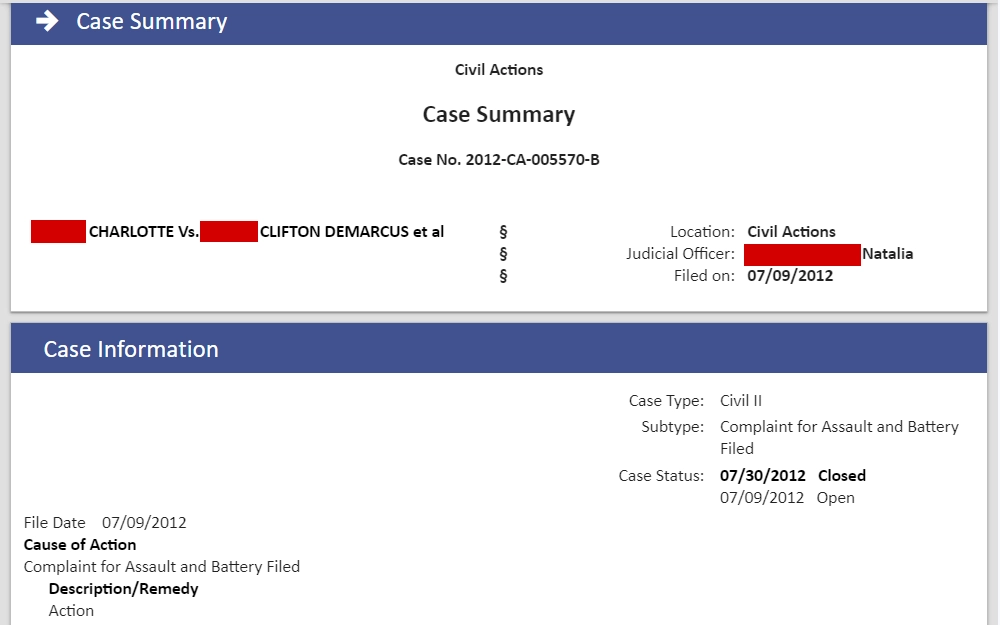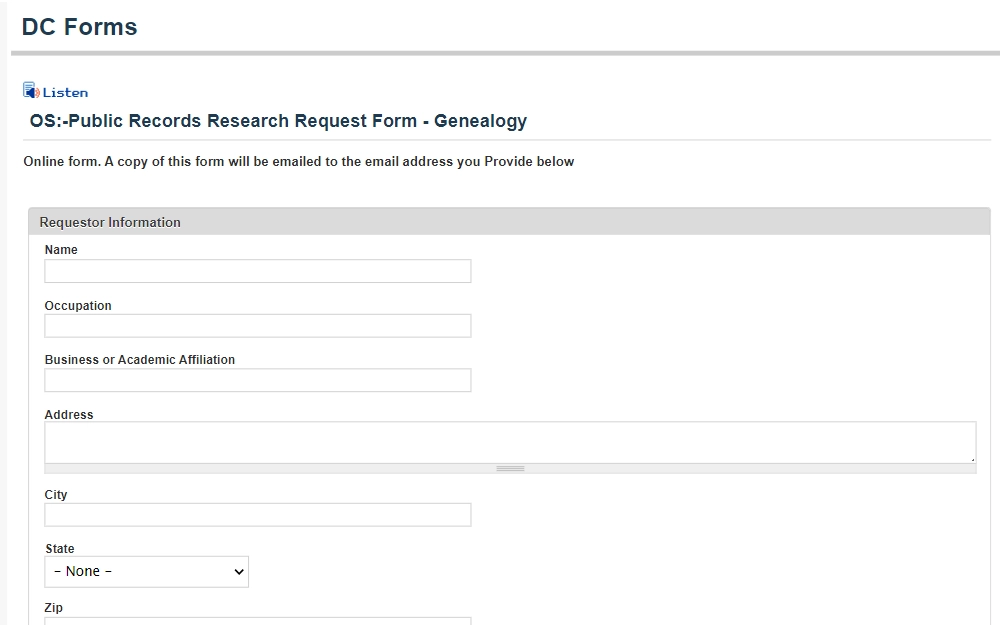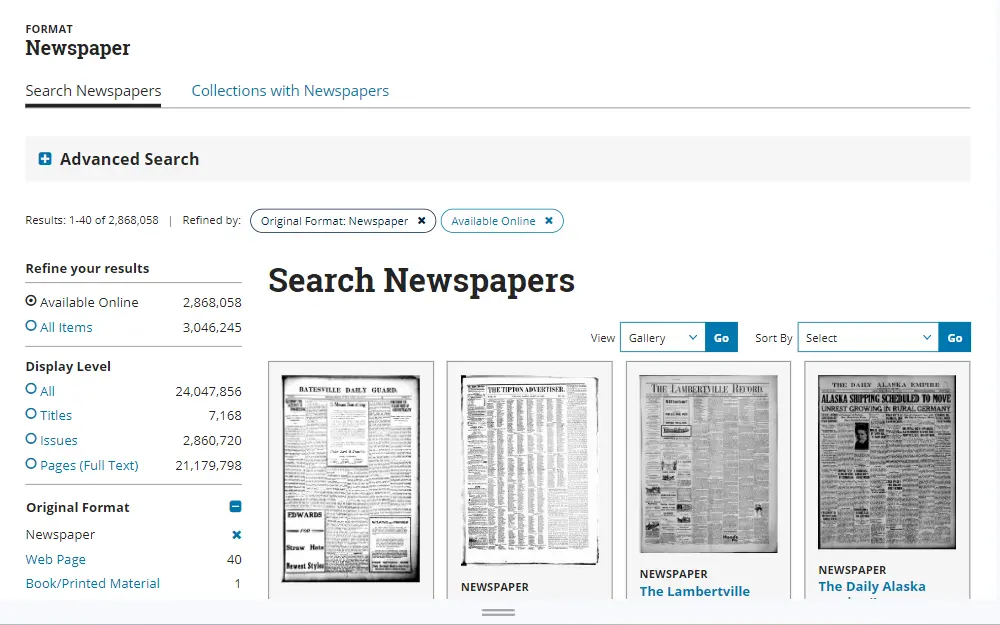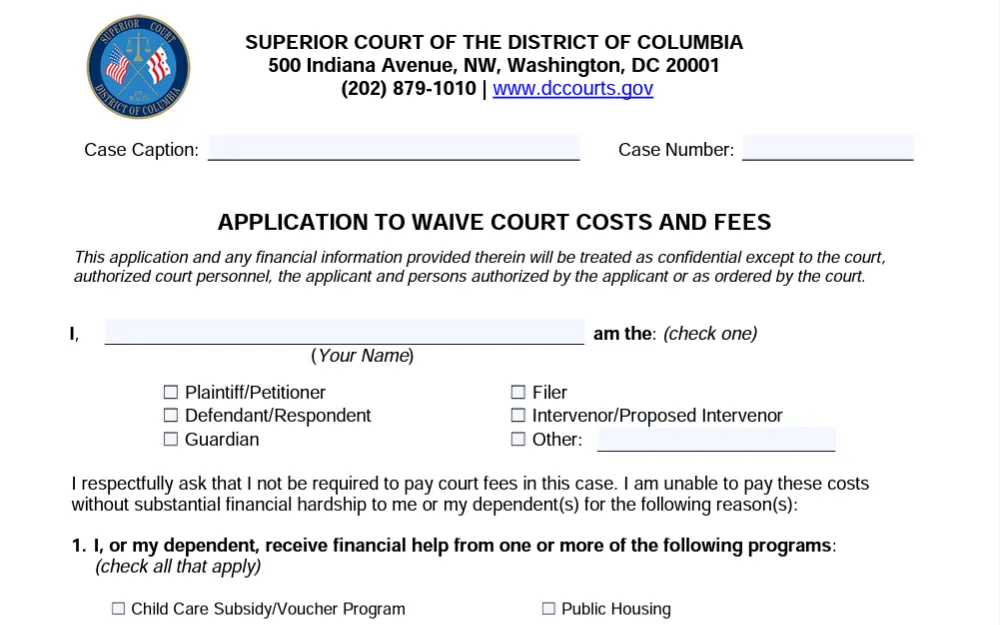Search for and view free Washington D.C. divorce records on anyone with this streamlined resource. Access to these records is possible because of the federal Freedom of Information Act (FOIA) and the district’s FOIA DC Code §§ 2-531-532.
Citizens often require access to these documents for many reasons, primarily to investigate the current status of a spouse, acquire records for immigration purposes, adoption or family matters such as changing names to remarry.
As there are no counties in the District of Columbia, patrons will retrieve divorce records from the district’s Superior Court at no cost. It is possible to search for records regardless of which agency has custody of them; clear instructions for looking up divorce records will be provided in this article.
Are Divorce Records in Washington D.C. Publicly Accessible?
Divorce records in Washington D.C. are largely considered public, which means anyone has access to these records—this is due to the DC Code §§ 2-531-532, which makes records of a public body – in this case, the courts – accessible to the general public.
However, while the public can view divorce records created to document a separation, they may not be able to request certified copies of decrees issued by the courts. These are restricted to eligible persons such as the owner of the record, children and parents of the parties on the record and authorized legal representatives.
Additionally, it is possible that the courts seal some divorce records for a variety of reasons, such as protecting the identity of children or victims of abuse and violence—in cases like this, these records are off-limits to the public.
Third-party sites may also be a source of divorce records. They do charge a service fee to retrieve records from government databases or social media sites. Nevertheless, if the companies are not authorized vendors by the district, they will not furnish copies that can serve official purposes.
Regardless of the accessibility of these divorce records, the U.S Census Bureau provides marriage and dissolution rates by state, including Washington D.C.; the District of Columbia has a divorce rate of 4.8 per 1000 persons against a national average of 6.9 in 2021.1
This places Washington D.C. at a small variance with the national average—this number does not distinguish same-sex couples.
How To View & Obtain Free Washington D.C. Divorce Records
Members of the public can view divorce records for free by contacting the Clerk’s Office of the Superior Court.2 Interested persons who need to acquire dissolution records that were filed before 1957 will need to contact the Clerk’s Office, while records created after this date are available online.
Patrons seeking more recent records can execute a free public divorce records search online without the need for registration. They may also request a divorce certificate by emailing [email protected]. There is a $32.00 search fee, and certified copies cost $11.00.

Requesters can visit the courthouse at the address below and make use of the computer terminals; there is a $0.10 charge per copy.
Clerk of the Court Civil Division
500 Indiana Avenue North West
Washington, District of Columbia 20001
Call 202.879.1133 for any questions or visit the Frequently Asked Questions.
As there are no counties or cities in the District of Columbia, interested parties can only search for divorce records generated by public agencies through the courts. Furthermore, only authorized individuals mentioned earlier can request copies of divorce decrees.
Retrieving Free Divorce Record Archives in Washington D.C. for Genealogy Purposes
Citizens who need dissolution records that are older for purposes of genealogy can acquire them through the District of Columbia Archives and the U.S. District Court for D.C.4
Archived divorce records help individuals establish marital details and reasons why couples had discord.
Most importantly, they provide information such as the names of the children of the divorcing couple, as well as both the date and place of marriage, which are all valuable sources of information for someone searching for their ancestral lineage.
The District of Columbia Office of Public Records (Archives) holds historical and permanent records for purposes of genealogical research.5 Interested parties may request D.C. divorce records using the Public Records Research Form, which permits the processing of requests electronically—the searchers receive requests via email.

Alternatively, individuals can visit the Archives; they should call 202.671.1105 or email [email protected] ahead to set up an appointment.
Office of Public Records
Suite 419
1350 Pennsylvania Avenue Northwest
Washington, District of Columbia 20004
Call 202-727-6306 or email [email protected] for any questions and inquiries.
Civil docket reports – of which divorce records are part – are available through the Public Access to Courts Records (PACER) or computer terminals at the court office. These records span between 1947 and 1987. PACER is not free and needs users to register for an account and pay for searches.
Users can locate a case in federal court or perform a nationwide divorce index search for federal court cases.7
Additionally, divorce data is acquired from the U.S. District Court for the District Court of Columbia—dissolution records created after 1957 are retrieved electronically. Interested parties can email [email protected] or visit the Clerk of the Court Civil Division at the address in the section above.8
Citizens can expand their search to the national level by contacting the National Archives Catalog, which is a free tool to use.
The Library of Congress has a collection of digitized newspapers that the public can scour for notices of divorces at no cost. Many of these newspapers date back to the pre-1900’s. Public libraries in the District of Columbia can also be a source of archived Washington D.C. records.

Are Common Law Marriages & Divorces Recognized in Washington D.C.?
Common law marriage is recognized in Washington D.C. and ten other states, including Colorado, Montana and Florida.10 A common law marriage, unlike a ceremonial union, is not formalized by a ceremony or a license. However, if a couple does present themselves as married, they must cohabitate together and have a mutual agreement to reflect the same.
In Washington D.C., they have the same rights as couples in a conventional marriage.
This type of marriage is either created in the district or if the couple comes from a state where this type of union is recognized, then it becomes legal in Washington D.C. pursuant to the Section 1 Full Faith & Credit Clause of the U.S. Constitution.11
Additionally, as of 1991, domestic partners are recognized in Washington D.C—unmarried partners, whether or not of the same gender, may register as domestic partners.12 Domestic partners are in a relationship, share a residence and have a common life together but are not married.
In the eyes of the law, there is no difference between a common law marriage and a traditional marriage. Therefore, couples who have this form of marriage can either separate by common law divorce or death. The divorce proceedings are the same as regular marriage, and property division will also occur as it would for a typical marriage.
As was touched on earlier, divorce records in Washington D.C. are viewed at the Superior Court. Since divorces occur for common law marriages as well, citizens may locate these records in the same way they do for regular divorces.
Interested parties may find dissolution of marriage records online for both types of unions or may request them by emailing [email protected].
For more details about the process to conduct these searches, please see the previous section above. The process of initiating a divorce is in the next section.
How To Apply for a Divorce & Respond to Divorce Notices in Washington D.C.
Couples in Washington D.C. may either file for divorce, legal separation or have a mutual and voluntary separation. Before considering filing for divorce in Washington D.C, the couple will need to have been residents in the district for at least six months as mandated by D.C. Code § 16-902(a).13
Washington D.C. does not permit at-fault divorces; thus, in order to obtain a divorce, the couple must have voluntarily agreed to the separation for at least 6 months or– a year if either party did not want to separate.
The courts will consider the couple as separate and, therefore a ground for divorce even if they are living together, as long as they are living separate lives and not engaging in marital relations as per D.C. Code § 16-904.
There are two types of divorces in Washington D.C.: an uncontested divorce – which is easier and less expensive to execute – and a more common contested divorce where the ex-husband and ex-wife will have to settle disputes around dividing assets, alimony, and child custody and support if children are present.
The couple may settle these issues themselves, enlist a lawyer or have a mediation. District of Columbia Courts offer mediation services through the Multi-Door Mediation Division.14 In cases where the divorce is contested, it is advisable to enlist the services of legal counsel.
Once the couple resolves their disputes, they may document it in a marital settlement agreement, which then becomes part of the divorce decree.
The party initiating the divorce is the plaintiff, and they will need to fill the Absolute Divorce Complaint. This form provides the court with information on the marriage and anything the plaintiff may be seeking in the divorce, such as property division, child custody and alimony.
The plaintiff can file these divorce papers electronically using File & Serve Xpress or by physically taking them to the Moultrie Courthouse at the Family Court Central Intake Center (CIC). The filing fees may be helpful to review beforehand.
Moultrie Courthouse
500 Indiana Avenue Northwest
Washington, District of Columbia 20001
It is possible to request a fee waiver due to financial hardship from the court by filing an application to file for divorce without paying a fee.

The plaintiff will receive a summons instructing them to deliver the dissolution papers to the defendant. They cannot hand deliver these, but instead can mail them (first-class) with two copies of Notice & Acknowledgement of Service, use registered mail, or personal service where someone not involved in the case can hand deliver the papers.
File proof within 60 days of filing the complaint showing the papers were served to the defendant. If unable to contact the defendant, contact the CIC about alternative methods. If this deadline is missed, the judge may dismiss the case unless an extension has been granted as per D.C. Super. Court Dom. Rel. Rules, rule 4.
The defendant has 21 days to respond; if the case is uncontested, they may file for a Divorce Consent Answer verifying there are no disputed issues. Otherwise, the defendant will file a Divorce Counterclaim Form. As per D.C. Code § 16-919, the defendant will need to provide evidence to support their claims at the hearing.
Regardless of whether the divorce is contested or uncontested, the couple will have to attend a hearing in D.C., and the plaintiff may file for a request for a divorce hearing to schedule a hearing.
Once the contested issues are ironed out in court, the judge will issue the dissolution decree—however, it will not be final until 30 days elapse as per D.C. Code § 16-920.16 This allows for an appeal from either party.
The divorce can, however, become effective once the judge signs the papers if the couple file for a waiver of the appeal of divorce order.
Couples can find additional legal resources for further assistance.
Washington D.C. divorce records can quickly be located at the Superior Courts at no cost and other public channels can help in genealogy research—this resource additionally provides succinct instructions on how to file for a divorce in the district.
If interested, you can also find District of Columbia marriage information; for even more record types, the Washington D.C. free public record search tutorial has insights and helpful links for tracking down background check reports, warrant details, inmate records, birth and death documents, court case information, and more.
References
1U.S. Marriage and Divorce Rates by State: 2011 & 2021. United States Census Bureau. (n.d.) Retrieved November 8, 2023, from <https://www.census.gov/library/visualizations/interactive/marriage-divorce-rates-by-state-2011-2021.html>
2About The Superior Court. District of Columbia Courts. (n.d.) Retrieved November 8, 2023, from <https://www.dccourts.gov/superior-court/about>
3Case Summary. DC Superior Court Portal. (n.d.) Retrieved November 8, 2023, from <https://portal-dc.tylertech.cloud/app/RegisterOfActions/#/D8F079AD1FF30F037100333B1715147BE35DF31A09EA4EBCA9F889D313041606/anon/portalembed>
4Vital Records. Library of Congress. (n.d.) Retrieved November 8, 2023, from <https://guides.loc.gov/district-of-columbia-local-history-genealogy/vital-records>
5Genealogy. DC. Gov. (n.d.) Retrieved November 8, 2023, from <https://os.dc.gov/service/genealogy>
6Public Records Research Request Form. DC. Gov. (n.d.) Retrieved November 8, 2023, from <https://dcforms.dc.gov/webform/os-public-records-research-request-form-genealogy>
7Search by Specific Court. PACER. (n.d.) Retrieved November 8, 2023, from <https://pacer.uscourts.gov/node/247>
8Court Records. U.S. District Court for the District of Columbia. (n.d.) Retrieved November 8, 2023, from <https://www.dcd.uscourts.gov/court-records#>
9Search Newspapers. Library of Congress. (n.d.) Retrieved November 8, 2023, from <https://www.loc.gov/newspapers/>
10Common Law Marriage. National Paralegal College. (2023) Retrieved November 8, 2023, from <https://nationalparalegal.edu/public_documents/courseware_asp_files/DomRelImmig/Marriage/CommonLawMarriage.asp>
11Article IV Relationships Between the States. Congress.Gov. (n.d.) Retrieved November 8, 2023, from <https://constitution.congress.gov/browse/article-4/section-1/>
12Domestic Partnership. DC. Gov. (n.d.) Retrieved November 8, 2023, from <https://dchealth.dc.gov/service/domestic-partnership>
13Filing for Divorce. District of Columbia Courts. (n.d.) Retrieved November 8, 2023, from <https://www.dccourts.gov/services/divorce-matters>
14Family. District of Columbia Courts. (n.d.) Retrieved November 8, 2023, from <https://www.dccourts.gov/services/mediation-matters/family>
15Application To Waive Court Costs And Fees. Superior Court Of The District Of Columbia. (2023) Retrieved November 8, 2023, from <https://www.dccourts.gov/sites/default/files/2023-03/Courtwide_Fee_Waiver_Application_March_2023.pdf>
16§ 16–920. Council of the District of Columbia. (n.d.) Retrieved November 8, 2023, from <https://code.dccouncil.gov/us/dc/council/code/sections/16-920>
